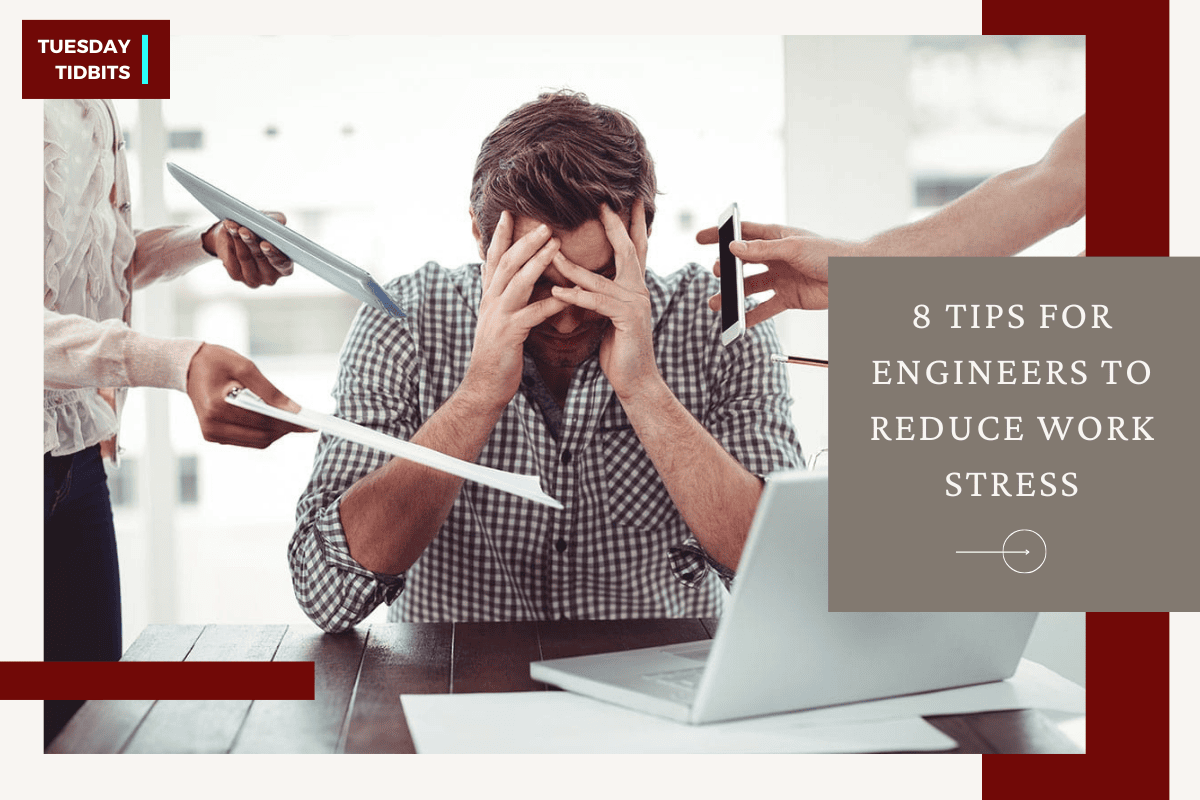We are a nation of increasing stress. In 2024, there are a myriad of ways for people to reach us. Work often seems never-ending and the quiet can be more difficult to find.
Work—and the stress that may accompany it—is no longer left behind at the close of the office door. According to the American Institute of Stress, job stress is the most significant source of stress for American adults. Increased levels of job stress have been linked to heart attack, hypertension and other disorders.
The National Institute for Occupational Safety and Health operates a stress research program. Through their studies, they have discovered that 40% of workers reported that their job was very or extremely stressful and 75% of employees believe that workers have more on-the-job stress than a generation ago. Engineering is a complex and dynamic field, and one that is not immune to extremely stressful situations. It is imperative to your health that you find ways to manage stress and avoid bringing too much stress home.
1. Identify the cause of the stress
First, identify the cause of the stress. Once the cause of the stress is identified, start tackling ways in which you might reduce that stress. If there are concerns about deadlines, create a list of what you need to accomplish in a step-by-step format. Review your time management and identify detractors that are preventing timely project completion.
2. Learn to say “No”
Sometimes minimizing stress and preventing overload is as fundamental as saying no. If you feel like you are being approached with deadlines that are impossible to meet, provide a more reasonable solution. Outline what demands can be made by the deadline and provide a time when the rest of the work can be completed. It is important to emphasize safety; a rushed engineer may be in danger of making a critical error.
3. Have an end of the day habit
Set a routine and have an end of the day habit. Perhaps this means creating a list for what you will do tomorrow by lining up tomorrow’s tasks. File paperwork, arrange your office, send end of the day review emails to the team. Set yourself up for a successful succeeding day at the end of the day, so that you don’t stress in the evening that you’re going to have to work double time in the morning.
4. Practice Breathing Techniques and Meditation
You can practice breathing and meditation techniques anywhere. If you feel work stress getting to you in the middle of the day, breathe in and count to ten seconds and breathe out for ten seconds. This simple exercise often helps to immediately reduce stress and anxiety. On the commute to and from work, visualize yourself as being successful. In the morning, visualize yourself having a successful day. And on the way home, meditate and visualize leaving the stress behind so when you walk in your door, you are able to just relax.
5. Exercise
Exercise helps tackle stress. If midday stress is starting to creep in, see if you can take a walk around or outside the office to breathe and meditate. Make it an end of the day routine to stop by the gym a couple of nights a week on the way home; consider taking the stairs rather than the escalator or find opportunities to stretch and have a relaxing walk.
6. Develop Good Technology Habits
There will be times when deadlines have you working after hours. But set a time limit to your day, especially when responding to emails. Many employees assume that answering emails throughout the evening shows how dedicated they are to the job. However, this may have a deleterious effect. In doing so, you remove the boundaries of acceptable times for people to contact you and people may think you are available at any hour of the day. Prioritize your time, and that includes time needed for yourself.
7. Confine your Work to a Particular Location
If possible, confine your work to a particular location. Make this the location of your productivity. Reserve spaces for no work, especially the bedroom or family living quarters. If you are required to work from home occasionally, set a spot in a corner or create a small office. When you leave the office, leave the work be for a while.
8. Prioritize Sleep.
A sleepy engineer is bound to be a subpar engineer. Prioritize your time for restful sleep. Set an evening routine, avoid responding to work emails in bed and create a space in your room that encourages restfulness. Proper sleep helps reduce stress and has a wide variety of health benefits.
While work stress may be inevitable, especially in the engineering profession, there are steps you can take to prevent bringing too much work stress home. The role of an engineer is critical to the success and safety of the world that surrounds us; a healthy engineer is a benefit to everyone.
What do you do to reduce stress. Let us know….








Leave A Comment